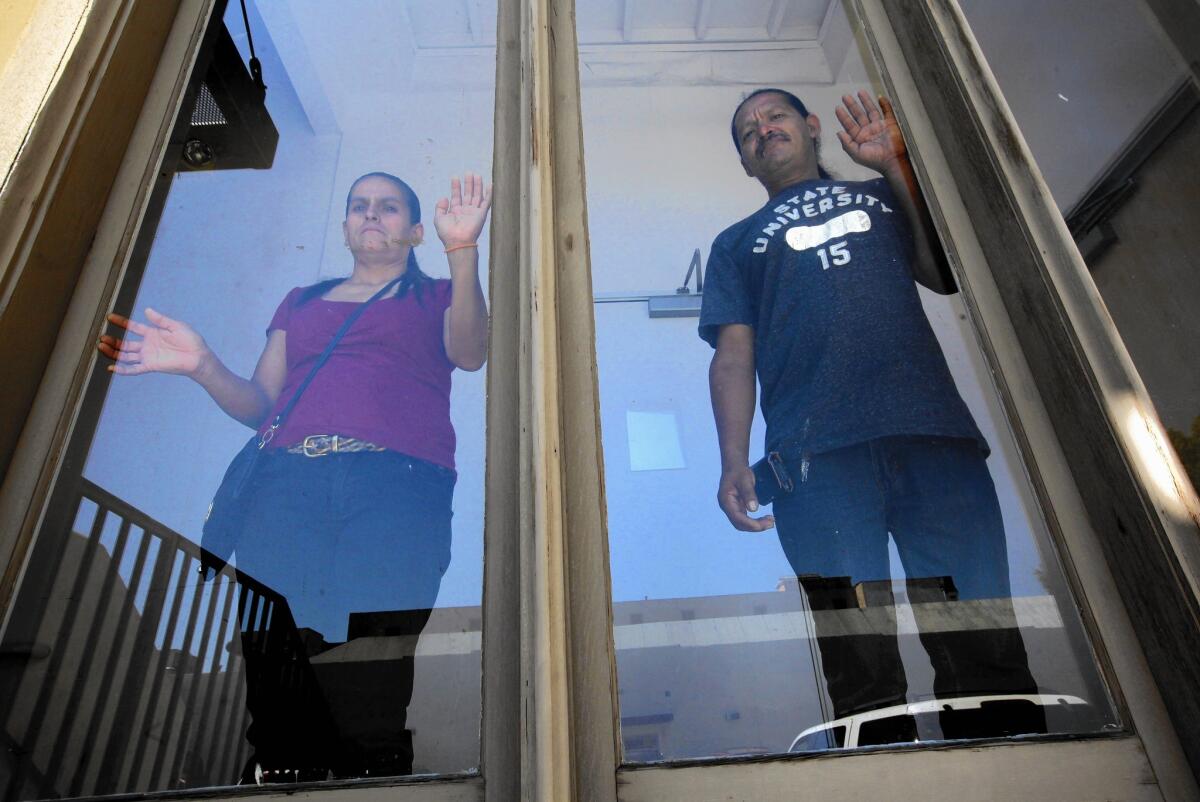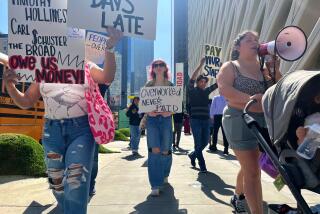Few wage theft victims ever get their back pay

Marina Torres and Jose Luis Cazares are still waiting on more than $83,000 in back pay — almost five years after filing a complaint with the state.
Jose Luis Cazares and Marina Torres cleaned the Regal Cinemas at L.A. Live for more than six years, working 11-hour night shifts seven days a week up until 2011.
Despite the long hours, the couple said they always got checks from Regal’s janitorial subcontractor for the same amount: $700, twice a month — a sum well below the minimum wage, with no overtime. Often the checks bounced or came late.
Nearly five years after filing a complaint with the California Labor Commissioner’s office, Cazares and Torres are still waiting on more than $83,000 in back pay owed to them — highlighting a systemic failure to enforce state laws against wage theft. A 2013 UCLA Labor Center study examining three years’ worth of state wage claims found that only 17% of workers who prevailed against their employers were able to recover any back pay.
See the most-read stories this hour >>
In 60% of cases, the employers had changed names or transferred assets to avoid liability.
That’s exactly what Cazares and Torres’ employer did. Soon after the couple filed a complaint with the state, they started receiving checks in the same amount — but with a different company name, NLP Janitorial instead of Coast to Coast West. All their bosses remained the same.
Officials with Coast to Coast West Inc., NLP Janitorial and Regal Entertainment Group did not respond to phone calls and e-mails seeking comment. California secretary of state records show Coast to Coast West has been suspended; NLP Janitorial is still active.
By changing corporate names, the cleaning firm complicated the legal process, helping the owners evade state orders to return more than $1.7 million to 52 workers across California.
“This is not working,” Cazares said.
Under current state law, legal liability extends only to subcontractors in many industries. But new legislation being considered by the California Legislature would make companies jointly liable for contractors performing services including janitorial work, landscaping, security and long-term healthcare.
Nearly 30% of low-wage workers in Los Angeles County reported being paid less than the minimum wage, according to a 2010 study by the UCLA Labor Center.
Across California, minimum-wage violations drove as many 41,000 families below the poverty line, according to a U.S. Department of Labor study from last year that examined data from California and New York.
Solutions have been in short supply. Across a wide range of industries — from janitorial to hospitality to carwash services — California employers have routinely underpaid workers and faced few consequences.
Filing a wage claim with the California Labor Commissioner’s Office can involve years of backlogs and appeals. That gives employers additional time to evade judgments from the state, according to employment attorneys and workers’ advocates.
“When an employer is willing to play this cat-and-mouse game, and shut down and reopen, it’s very hard to chase that money without a lot of time and legal resources,” said Danielle Lang, an attorney at Bet Tzedek Legal Services in Los Angeles, which has represented thousands of low-wage workers.
California lawmakers are now considering legislation that would give the Labor Commissioner’s Office broader powers to collect unpaid wages from employers. The bill, from Senate leader Kevin de Leon (D-Los Angeles), aims to address the problem of employers’ hiding assets in shell corporations by making individual owners liable for the unpaid wages. The penalties would also extend to subsequent corporations that take over the operations if employees are doing “substantially the same work in substantially the same working conditions.”
If employers fail to pay a judgment, they must post a $150,000 bond or be barred from doing business in the state. The bill passed the Senate and could face a vote in the Assembly within a week.
Tia Koonse, legal and policy research manager at the UCLA Labor Center, said the bill would pressure employers to settle with aggrieved workers. Under the current system, she said, few employers even show up to hearings at the Labor Commissioner’s Office.
“If the employer knows that they’ll never be able to get away with it, there’s a higher likelihood that they’ll come to the table,” Koonse said. “The disputes will be resolved far earlier.”
The UCLA Labor Center and a coalition of workers’ advocacy groups in recent weeks have compiled a series of case studies revealing the difficulty workers have in collecting back pay, even when the state rules in their favor.
Julio Ponce had worked at Century Car Wash in Inglewood for nine years, often receiving only $40 or $50 for 10 hours of work. He accepted the pay because it was steady, but beginning in 2010 Ponce said owner Kenneth Gharib made workers show up in the morning but not clock in until hours later.
Sometimes Ponce showed up and waited for two to three hours, only to be sent home without pay. He and another co-worker started complaining and decided to call the California Labor Commissioner’s Office.
After investigators showed up to interview workers and management, Ponce said, managers cut his hours drastically. He said he and a co-worker approached Gharib, who told them they needed to sign an agreement absolving the company of any wrongdoing.
When they refused to sign it, Ponce said, Gharib fired him and the other employee. Ponce last year won a $23,947 award for back pay from the California Labor Commissioner’s Office and prevailed in a separate National Labor Relations Board case involving unfair labor practices and unlawful termination.
He has yet to see any of the money. Century Car Wash still exists at the same location, but it is now run by a new owner. Gharib could not be reached for comment, and his past lawyers did not return calls and e-mails seeking comment.
The new manager of Century Car Wash, Kami Emein, said he also ran the business before Gharib and his partners did. Emein said he took over the operations as part of a separate court dispute with Gharib. Emein said Gharib owed him money, and the carwash was the only asset he could take.
Under state law, new owners of carwashes are still liable for wage claims from previous owners. Emein said he was not aware of the law when he took over the operations.
“We were forced to get this carwash back because of all the issues he had,” said Emein, who said he treats his employees well and had nothing to do with the operations under Gharib.
Workers also tried to recover back wages from the state-mandated carwash bond fund, a program instituted a decade ago following findings of rampant wage violations in the industry. But they discovered the previous owners had failed to post the required bond, said Lang of Bet Tzedek Legal Services, who is representing the workers.
Ponce still holds out hope he’ll eventually see the money.
“You just have to continue with the faith,” he said. “For years, he was taking from me. Now is the time that he is going to go through the same thing I did, where he’ll be owing every single day.”
If history is any guide, the wait may continue. Cazares and Torres, who worked at the Regal L.A. Live, are still waiting on money from the two subcontractors, Coast to Coast West and NLP Janitorial.
Lilia Garcia-Brower, executive director of the Maintenance Cooperation Trust Fund, which monitors conditions in the janitorial industry, said when the subcontractor changed names it made the legal process more time-consuming.
A state investigation found that both firms were liable for the back wages. The companies have appealed the citations from the state, and a hearing has not yet been scheduled.
Meanwhile, the work situation for Cazares and Torres hasn’t improved. They now work at another major theater chain for another subcontractor. They both work long hours but receive only one paycheck of $1,800 a month between the two of them.
They declined to name the theater and the subcontractor to avoid angering their superiors. They are considering filing another wage claim, but are unsure whether they can endure the long process again.
“We can’t find a different job, or a better contractor,” Cazares said. “Right now we only have this.”
MORE ON WAGE THEFT:
Southern California is hotbed for wage theft in garment industry
Editorial: Proposed bill on fighting wage theft is strong but needs more precision
Abcarian: Cheerleaders’ wage-theft lawsuit to cost Oakland Raiders $1.25 million
More to Read
Inside the business of entertainment
The Wide Shot brings you news, analysis and insights on everything from streaming wars to production — and what it all means for the future.
You may occasionally receive promotional content from the Los Angeles Times.











